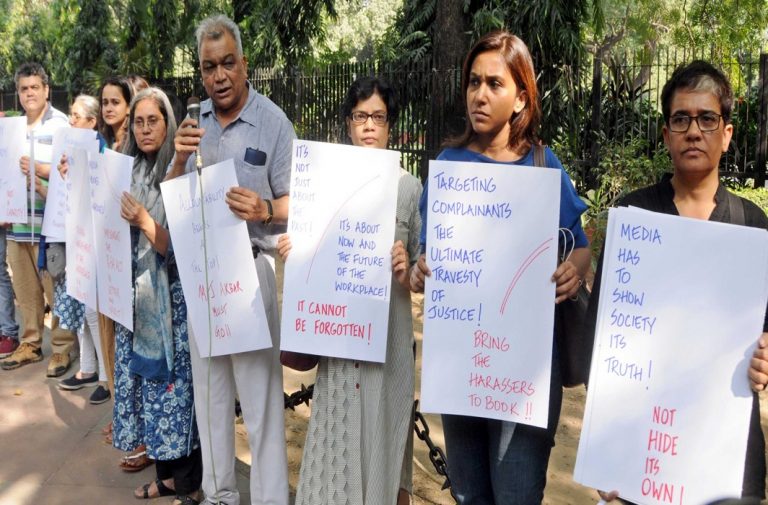
Above: A protest in support of journalists who have alleged sexual harassment as part of #MeToo
It is important for women in MeToo movement to know that there’s a legal bar on filing complaints of sexual harassment after a certain period of time
By Ira Gupta
Nowadays, everybody is talking about #MeToo. Women from various sectors are coming forward and reporting the sexual harassment they faced at some point in their lives. Some of this even goes back decades. Many have taken recourse to legal action and filed complaints against the offenders.
While social media is filled with news related to the #MeToo movement and many articles have been published defining sexual harassment and what action should be taken by the victims, one aspect has been ignored.
Can a victim of sexual harassment report the offence and file a case at any point in her life? Is there any law of limitation which bars such complaints from being filed after a period of 10 years or more? The answer is “yes”, there is a bar on filing complaints after a certain period of time.
In India, the Limitation Act, 1963, talks about a limitation period in the case of civil suits and other proceedings relating to it. Though there is no specific provision under which a victim of sexual harassment can file a civil suit, there is a period of limitation prescribed in the Act for filing a civil suit for compensation.
The time limit for a civil suit for compensation, where a person breaks a contract with the plaintiff, is one year from the date of the breach, according to Article 78 of the Limitation Act. Similarly, the civil suit for compensation for illegal, irregular or excessive distress is one year from the date of distress (Article 79 of the Act).
So, if any woman files a civil suit for compensation under the Law of Tort against the sexual harassment faced by her after the prescribed period of limitation as enshrined in the Limitation Act, then such a suit will not be entertained and will be dismissed.
For dealing with increasing sexual harassment of women at the workplace, the government enacted the Sexual Harassment of Women at Workplace (Prevention, Prohibition and Redressal) Act, 2013 (SHWW Act, 2013). This Act provides for two kinds of complaint mechanisms: Internal Complaints Committee (ICC) and Local Complaints Committee (LCC). In every workplace where there are more than 10 employees, it is the responsibility of the employer to constitute an ICC as per Section 4 of the SHWW Act. Further, as per Section 6 of this Act, every district officer has to constitute an LCC in the concerned district.
The limitation period for filing a sexual harassment complaint at the workplace either to the ICC or the LCC is clearly specified in Section 9 of the SHWW Act. It is three months from the date of the incident, and in case of a series of incidents, it is within a period of three months from the date of the last incident.
However, the complaint can be filed after a period of three months provided the complainant gives a cogent reason for the delay. The ICC or LCC can extend the limitation period, but not beyond three months. Thus, under the Sexual Harassment of Women at Workplace Act, 2013, the complaint has to be filed within three months of the date of the incident.
There is also a belief that there is no limitation period for filing a police complaint. However, as per the provisions of Section 468 of the Criminal Procedure Code, 1973, no court can take cognisance of the following offences after the expiry of the period of limitation:
- Six months, if the offence is punishable with fine only
- One year, if the offence is punishable with imprisonment for a term not exceeding a year
- Three years, if the offence is punishable with imprisonment for a term exceeding one year but not exceeding three years.
However, the period of limitation can be condoned by the court if the delay in filing the complaint is properly explained. Also, there is no bar on limitation for filing a complaint and for the court to take cognisance of an offence which is punishable with imprisonment exceeding three years.
Also, the period of limitation in relation to offences which may be tried together shall be determined with reference to the offence, which is punishable with more severe punishment or with the most severe punishment.
The period of limitation starts from the date of the offence or from the date when the aggrieved person comes to know about the commission of the offence or from the date when she comes to know about the offender. In cases of continuing offence, the period of limitation starts from the date on which the last offence was committed.
The aggrieved woman can file a police complaint under various provisions of the Indian Penal Code, 1860, depending on the offence committed against her. Similarly, she can also file a complaint under the Indecent Representation of Women Act.
If a girl up to the age of 18 years is subjected to any kind of sexual harassment, then the police complaint can be lodged under the provisions of the Protection of Children from Sexual Offences Act, 2012.
It is important that a woman take immediate legal action against an offender committing any kind of sexual harassment against her as justice delayed is justice denied.
—The writer is a legal adviser to Heart Care Foundation of India

